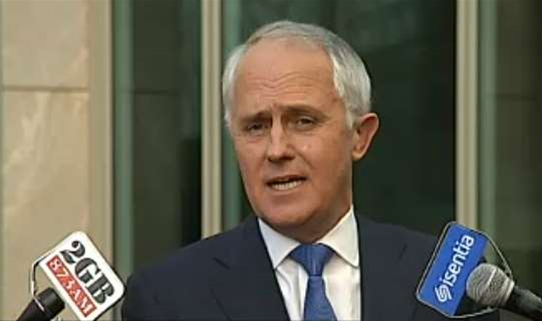Malcolm Turnbull has resigned as Australia's Communications Minister after launching a bid to take over the country's leadership from Prime Minister Tony Abbott.

Turnbull today requested a ballot for the Liberal Party leadership following ongoing unrest within the Coalition and dissatisfaction with the Prime Minister's performance.
"This is not a decision anyone could take lightly," Turnbull said today.
"This course of action has been urged upon me by many people over a long period of time. It is clear enough that the government has not been successful in providing the economic leadership that we need."
The former Communications Minister said the Coalition needed a "different style of leadership" to avoid losing the next federal election.
"We need advocacy, not slogans," Turnbull said.
"If we continue with Mr Abbott as Prime Minister, it is clear enough what will happen. He will cease to be Prime Minister and he will be succeeded by Mr [Bill] Shorten.
"We have lost 30 Newspolls in a row. It is clear people have already made up their mind about Mr Abbott's leadership."
Abbott is expected to make a statement shortly. It is not yet known when a ballot will take place. A leadership contest would be the second Abbott has faced in his two years as PM.
Turnbull was appointed Communications Minister in September 2013 following the Coalition's win in the federal election.
He convinced Abbott to abandon his 2010 policy to “destroy” the NBN in favour of the current multi-technology model approach.
NBN Co recently revealed its construction costs for the MTM model would exceed the forecasted $41 billion price tag by as much as $15 billion. The company will need to raise funds from the private sector to make up the shortfall.
During his tenure, Turnbull was forced to step in on two occasions to save his government's highly-criticised technology policies.
Following a disastrous interview by Attorney-General George Brandis on the unpopular data retention legislation, Turnbull was asked to sell the policy to the wider public. The legislation was ultimately passed into law thanks to the support of the Labor Party.
The former Communications Minister was also handed responsibility for the government's overseas website blocking bill, aimed at cutting down on copyright infringement, from Brandis in March.
The legislation passed despite strong opposition from the Australian Greens and some independent and minor party MPs, the telecommunications industry, technology companies and consumer groups.
Part of Turnbull's remit was leading the nation's technology strategy.
In January he debuted the new Digital Transformation Office, which is based on the UK's Government Digital Service and aims to overhaul customer-facing digital service delivery.
The DTO was handed $254 million over four years in the most recent federal budget towards the digital delivery agenda.
More to come

.png&h=140&w=231&c=1&s=0)

.png&h=140&w=231&c=1&s=0)



_page-0001.jpg&w=100&c=1&s=0)


.png&w=120&c=1&s=0) Tech in Gov 2025
Tech in Gov 2025
 Forrester's Technology & Innovation Summit APAC 2025
Forrester's Technology & Innovation Summit APAC 2025
.png&w=120&c=1&s=0) Security Exhibition & Conference 2025
Security Exhibition & Conference 2025
 Integrate Expo 2025
Integrate Expo 2025
 Digital As Usual Cybersecurity Roadshow: Brisbane edition
Digital As Usual Cybersecurity Roadshow: Brisbane edition











.jpg&h=140&w=231&c=1&s=0)



